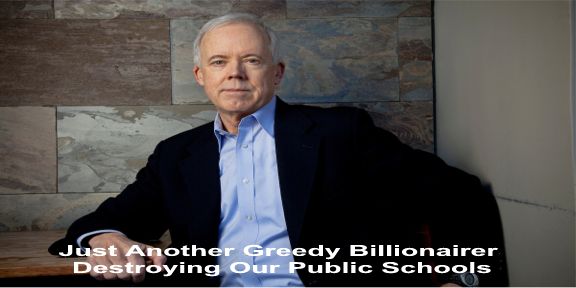Election Inflections: Mega-Donor Bill Bloomfield’s Journey From GOP Champion to Charter School Rainmaker – Capital & Main:
Election Inflections: Mega-Donor Bill Bloomfield’s Journey From GOP Champion to Charter School Rainmaker
Over the past two decades, businessman Bill Bloomfield has poured millions of dollars into political campaigns, becoming one of California’s most prolific donors. A
supporter of Republican presidential candidates George W. Bush, Rudy Giuliani and John McCain – he served as McCain’s national volunteer director – he has also used his personal wealth to back former California Governor Arnold Schwarzenegger and the unsuccessful gubernatorial effort of GOP candidate Meg Whitman.
In 2012,
Bloomfield funneled $7.5 million into his own race against the venerable Congressman Henry Waxman, who prevailed despite his opponent’s spending spree. In 2014 and 2015, he bankrolled the campaigns of two state Senate candidates, contributing more than $2 million to help propel them to victory.
Bloomfield has continued to spend big in this year’s election cycle, but much of his money –more than $2 million and counting – has gone to the independent expenditure committee of the charter school powerhouse EdVoice, which is backing incumbents and office-seekers who support an aggressive expansion of charters in California. EdVoice’s IE has contributed nearly $9 million to pro-charter candidates this year – part of a blizzard of spending by California charter school advocates that now stands at more than $23 million.
Bloomfield, former CEO of a commercial laundry equipment firm previously known as Web Service Company, and founder of an Internet hosting company, is not as well known as other deep-pocketed charter school advocates such as Eli Broad and the Walton family. But he’s become one of the charter movement’s biggest spenders, and
California’s fourth-largest political donor.
Bloomfield has also played a pivotal role in the rise of a
new breed of California Democrats who frequently align themselves with big business. He was a champion of – and a major contributor to – several ballot measures that changed the face of California politics. The first, 2008’s Proposition 11, set the stage for far-reaching state-level redistricting, and was followed two years later by another measure, Prop. 20, that extended the changes to congressional districts. In 2010 voters also approved Proposition 14, which created open primaries, with the top two vote-getters facing off in November regardless of party affiliation.
The top-two system promoted by Bloomfield and others has been a boon to powerful special interests that traditionally backed Republican candidates but found that strategy becoming increasingly obsolete as the GOP lost influence in California. And while Bloomfield has positioned himself as a moderate reformer working to counteract special interests and partisan gridlock – he even joined the board of a respected watchdog group that monitors the influence of money in politics – critics see a different pattern.
To them, Bloomfield’s choice of candidates and issues — including his financial support of pro-charter efforts – exemplifies little more than a pragmatic conservative strategy in a liberal state. “He has figured out how to be a Republican in the bluest state of them all,” says Karen Wolfe, a California parent and founder of
PSconnect, a community group that advocates for traditional public schools. “If you are looking for the best illustration that the charter movement is really just an effort to deregulate and shrink government, you see Bill Bloomfield.”
Steven Maviglio, a Democratic political consultant, agrees. “I think he is part of a larger group of Republicans in California who have realized there is little sense in investing in the Republican Party because they are so in the minority. They realize it makes more sense to put money into Democrats who are likely to adopt the ideals of Republicans.”
Over the years, Bloomfield has invested in a variety of social causes, starting with the anti-smoking billboard he and his father erected on Santa Monica Boulevard in Westwood in 1987 that’s been keeping a running tally of smoking-related deaths annually ever since. As described in his
detailed personal website, he helped open the West Coast office of the Brady Center to Prevent Gun Violence, and he’s a board member of California Common Cause, a nonpartisan government watchdog group that advocates for political transparency. (While a recent investigation by California Hedge Clippers, a coalition of community groups and unions, concluded that Bloomfield was among a group of wealthy Californians who, in 2012, used the dark money networks California
Election Inflections: Mega-Donor Bill Bloomfield’s Journey From GOP Champion to Charter School Rainmaker – Capital & Main:


















